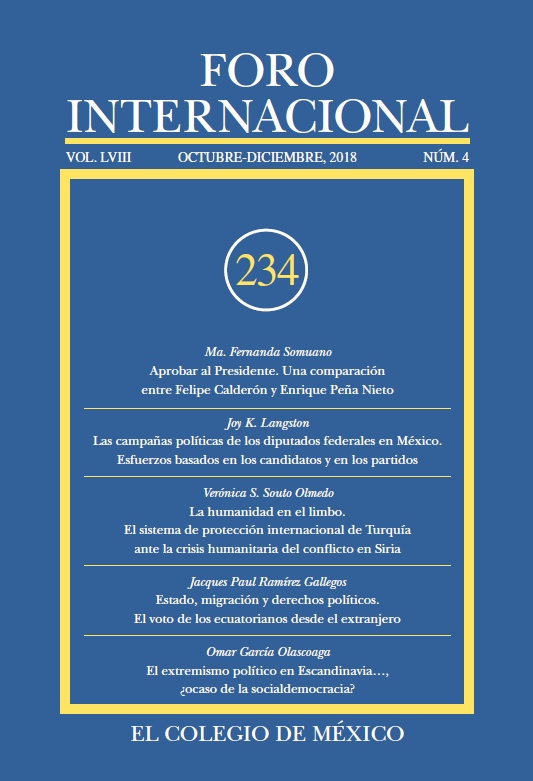Federal Deputy Campaigning in México: Personal and Party Based Efforts.
DOI:
https://doi.org/10.24201/fi.v58i4.2549Keywords:
Campaigns, personal vote, political parties, political careersAbstract
This paper explores how Mexican congressional candidates campaign in single-member-districts. To do so, it looks beyond the effects of the electoral system and single term limits, and examines both party leaders’ incentives and the strong likelihood that deputies will return to their locality to continue their political careers. We argue that theories that only examine electoral rules miss the crucial input of the party leadership as well as different ways that office-seeking deputies can continue career trajectories. With a database on the campaign activities for a sample of the candidates from the three major parties in Mexico, we show first, that plurality candidates are active campaigners; and second, that running in competitive districts and holding greater personal experience lead to more personal vote type activities. Nonetheless, national party offices are also active participants in federal deputy campaigns – underlining the mixed nature of modern campaigning.
Downloads
References
Bowler, Shaun y David M. Farrell, “Electoral Institutions and Campaigning in Comparative Perspective: Electioneering in European Parliament elections”, European Journal of Political Research, vol. 50, núm. 5, 2011, pp. 668-688.
Cain, Bruce, John Ferejohn y Morris Fiorina, The Personal Vote. Constituency Service and Electoral Independence, Cambridge, Harvard University Press, 1987.
Canache, Damarys, Jeffery Mondak y Ernesto Cabrera, “Voters and the Personal Vote: A Counterfactual Simulation”, Political Research Quarterly, vol. 53, núm. 3, 2000, pp. 663-679.
Carey, John M. y Matthew S. Shugart, “Incentives to Cultivate a Personal Vote: A Rank Ordering of Electoral Formulas”, Electoral Studies, vol. 14, núm. 4, 1995, pp. 417-439.
Cox, Gary W. y Mathew D. McCubbins, Legislative Leviathan. Party Government in the House, Berkeley-Los Angeles, CA, University of California Press, 1993.
Daniel, Kermit y John R. Lott Jr., “Term Limits and Electoral Competitiveness: Evidence from California’s State Legislative Races”, Public Choice, vol. 90, núms. 1-4, 1999, pp. 165-84.
Díaz Jiménez, Oniel Francisco, “Marketing político y profesionalización de las campañas electorales del Partido Acción Nacional y el Partido de la Revolución Democrática (1994-2006)”, Polis, vol. 11, núm. 1, 2015, pp. 119-168.
Eaton, Kent, “Political Obstacles to Decentralization: Evidence from Argentina and the Philippines”, Development and Change, vol. 32, núm. 1, 2001, pp. 101-127.
“Entrevista a María de las Heras, otrora experta de encuestas del PRI”, 22 de noviembre de 2001.
“Entrevista a Sandoval, diputado del PRI”, abril de 2002.
“Entrevista a Lázaro Arias, diputado del PRI”, 6 de mayo de 2004.
“Entrevista a Raúl Mejía, diputado del PRI”, 27 de mayo de 2004.
“Entrevista a Mario Zepahua, diputado del PRI”, 31 de mayo de 2004.
“Entrevista a Humberto Cervantes, del PRI”, 1 de junio de 2004.
“Entrevista a Jesús María Ramón, exdiputado del PRI en Puebla”, 15 de junio de 2004.
“Entrevista a Norberto Corella, diputado del PAN”, 23 de febrero de 2005.
“Entrevista a Gustavo Madero, diputado federal”, 2 de marzo de 2005.
“Entrevista a María Araceli Vázquez Camacho, diputada federal”, 10 de junio de 2010.
“Entrevista a María de la Paz Quiñones, diputada federal”, 14 de junio de 2010.
Exeni, José Luis, “Acción mediática en tiempo de elecciones”, en Yolanda Meyenberg (coord.), Dos de julio: reflexiones posteriores, México, FLACSO-IIS-UAM-I, 2001.
Flamand, Laura, The Vertical Dimension of Government: Democratization and Federalism in Mexico, Rochester, University, 2004.
Gelman, Andrew y Gary King, “Estimating Incumbency Advantage without Bias”, American Journal of Political Science, vol. 34, núm. 4, 1990, pp. 1142-1164.
Giraudy, Augustina, “The Politics of Subnational Undemocratic Regime Reproduction in Argentina and Mexico”, Journal of Politics in Latin America, vol. 2, núm. 2, 2010, pp. 53-84.
Hernández Rodríguez, Rogelio, El centro dividido: la nueva autonomía de los gobernadores, México, El Colegio de México, 2008.
INE: Instituto Nacional Electoral, Memorias del Proceso Electoral Federal 2011-2012, en www.ine.mx
Karp, Jeffrey A. y Susan A. Banducci, “Party Mobilization and Political Participation in New and Old Democracies”, Party Politics, vol. 13, núm. 2, 2010, pp. 217-234.
Kerevel, Yann, “(Sub)national Principals, Legislative Agents: Patronage and Political Careers in Mexico”, Comparative Political Studies, vol. 48, núm. 8, 2015, pp. 1020-1050.
Langston, Joy y Allyson Benton, “A ras de suelo: apariciones de candidatos y eventos en la campaña presidencial de México”, Política y gobierno, vol. temático: “Elecciones en México”, núm. 2, 2009, pp. 135-176.
Mayhew, David, Congress: The Electoral Connection, New Haven, Yale University Press, 1974.
Meneses Rocha, María Elena y Jacob Bañuelos Capistrán, Internet y campañas electorales en México. La oportunidad postergada, Toluca,Instituto Electoral del Estado de México, 2009 (Serie Breviarios de Cultura Política Democrática, núm. 8).
Samuels, David, “Incentives to Cultivate a Party Vote in Candidatecentric Electoral Systems”, Comparative Political Studies, vol. 32, núm. 4, 1999, pp. 487-518.
_____, Ambition, Federalism, and Legislative Politics in Brazil, Nueva York, Cambridge University Press, 2003.
Shugart, Matthew y Martin Wattenberg, Mixed-Member. Electoral Systems. The Best of Both Worlds?, Nueva York-Oxford, Oxford University Press, 2001.
Szwarcberg, Mariela, “Political Parties and Rallies in Latin America”, Party Politics, vol. 20, núm. 3, 2014, pp. 456-466.
Tello-Leal, Edgar, Diego Armando Tello-Leal y Claudia Maricela Sosa Reyna, “Reflexiones sobre el uso de las tecnologías de
información y comunicación en las campañas electorales en México”, Revista Virtual Universidad Católica del Norte, núm. 36, 2012, pp. 33-47.
Tosoni, María Magdalena, “Notas sobre el clientelismo político en la Ciudad de México”, Perfiles Latinoamericanos, vol. 29, núm. 1, 2007, pp. 47-69.
Zittel, Thomas y Thomas Gschwend, “Individualised Constituency Campaigns in Mixed-Member Electoral Systems: Candidates in the 2005 German Elections”, West European Politics, vol. 31, núm. 5, 2008, pp. 978-1003.













